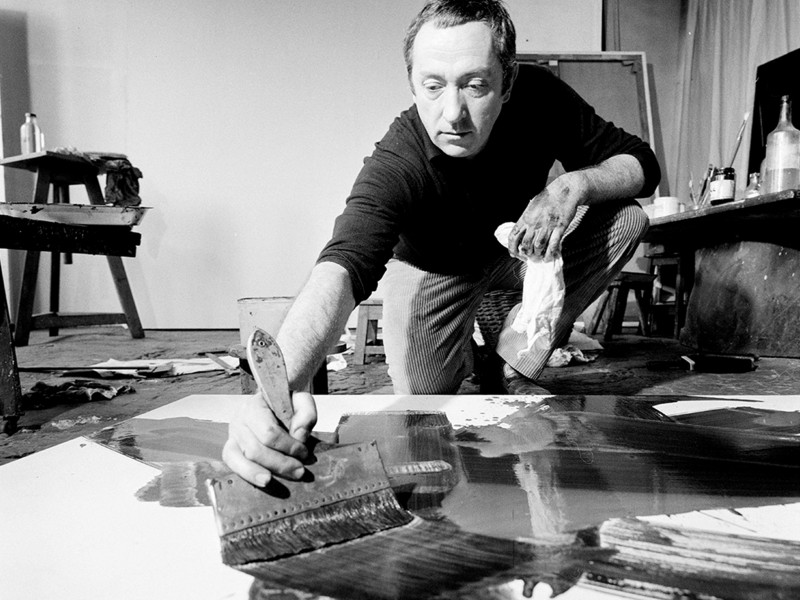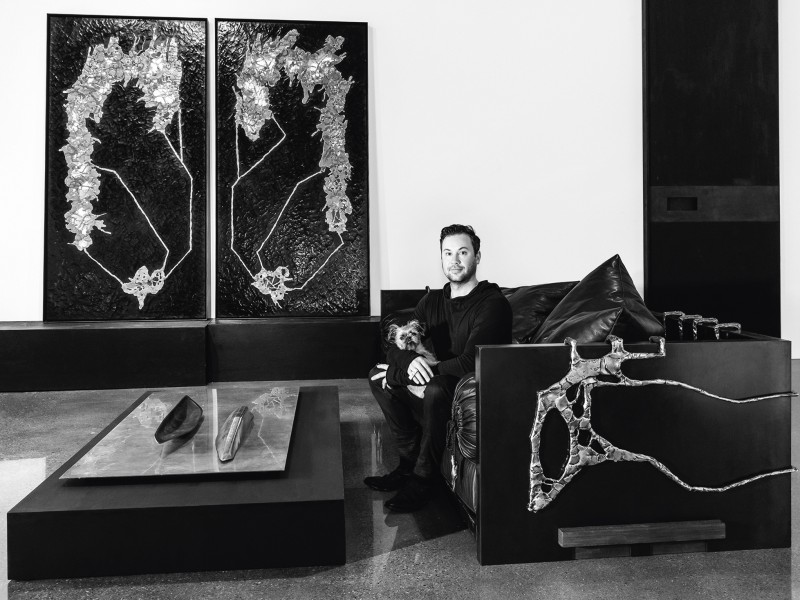Memories are so often olfactory. Although every scent is made of a simple combination of carbon, nitrogen, hydrogen, oxygen and sulfur, the experience of scent is both subjective and personal. Selecting a fragrance for another is often one of life’s most intimate and difficult acts. The sudden experience of a scent can conjure up memories of childhood, love, family or a moment seemingly lost in time. One of my most redolent memories is of my mother spraying a mist on her wrists—and always in her hair—just before leaving the house. Lingering long after her presence, the signature would always linger in her wardrobe or on her evening dress. I mention the scent and its accompanying experience to perfumer Frédéric Malle, during our telephone interview and he immediately understands what I mean. “It is a very lovely fragrance,” he says elegantly and succinctly. As both fragrance royalty and the perfumer’s perfumer, you know he means it.
While much of the current stock of mass produced perfumes fail to stimulate the imagination and deliver a commensurate feeling of intimacy and connection to those responsible for their inception, Malle has always sought to reimagine this paradigm and re-establish our connection to maker. Editions de Parfums is the moniker of his much celebrated collection of uncompromising and luxurious fragrances that act as a vessel for this endeavor. Born during an era where many perfume lovers have felt increasingly disconnected from the artisans who were capturing their imaginations and bringing to life their autobiographic dreams, Editions de Parfums redefined this ubiquitous relationship by putting the direction and vision back into the hands of highly skilled artisans. Unphased with catering for an elite group of fragrance connoisseurs, Malle has combined historical elements of perfumery into a modern market while establishing a platform for true creative freedom and expression of identity.
Inspired by the prestigious French publishing house Gallimard, the term ‘edition’ not only speaks to the serial nature of the collection but captures the nature of Malle’s role as both editor, publisher and curator of sensory narratives. Malle is well celebrated for his willingness to suspend his own ego in favour of the professionals with whom he works, going so far as to position their names atop of each outcome. Malle’s collaborations read like a roll call of doyens and demigods—Jean-Claude Ellena, Dominique Ropion, Maurice Roucel, Carlos Benaim, Olivia Giacobetti, Pierre Bourdon, Edmond Roudnitska, Ralf Schwieger, Edouard Flechier, Bruno Jovanovic, Michel Roudnitska and Sophia Grojsman. They may not be household names to the uninitiated but in the world of fragrance they are highly respected iconoclasts and olfactory luminaries. The Editions de Parfums creators are as important as the finished result. In professional parlance Malle is what is known as an ‘evaluator’. He has an intimate understanding of the structure of fragrances, and an ability to critique scent, “fragrance is part of life, it is a ‘live’ thing. It is not intellectual, it is not practical, it is a purely sensual experience, part of one’s life. As much as food.” But of course.
Established in 2000, Editions de Parfums was a reaction of sorts to the plethora of fragrances on the market, the cookie cutter smells that evince a culture obsessed with celebrity. Malle’s desire to collaborate with the worlds most talented creatives came perhaps not only from a genetic predispositon to perfume, but a desire to reinforce the individualism and specificity of fragrance. His grandfather, Serge Heftler-Louiche, was notably the founder of Parfums Christian Dior—a foundation stone of sorts that would stimulate Malles’ curiosity and elevate his knowledge and understanding of the raw materials used in the composition of perfumes. Immersed in the world of perfumery, Malle started his journey in 1988 at the prestigious perfume laboratory Roure Bertrand Dupont honing his innate skill, soon moving on to work with designers such as Christian Lacroix, with whom he worked for four years before launching Editions de Parfums. Having since worked with diverse clients ranging from Mark Birley (of Annabel’s nightclub fame) on his self titled men’s fragrance, to shoe designer Pierre Hardy on a range of limited edition travelling containers for perfume, inspired by the work of artist Anish Kapoor. This all in addition to the release of candles, home scents, incense and body lotions.
Malle’s carefully designed stores in Paris, New York and London embrace the experiential dimensions of engaging with perfume. Frustrated by the industry’s propensity for using paper blotters, Malle set out to find new ways for customers to first experience a scent. For those of you who have ever run the gauntlet of department store perfume counters, you will no doubt be familiar with those who Malle refers to as ‘supposed experts’. “I found it paradoxical that we work with perfumers for a minimum of six months to make a fragrance and it has to seduce someone in only 10 seconds. But, if the right person wears the right fragrance, it can be extremely seductive, so then it is a well spent six months or more. So, for my own stores, I designed glass smelling ‘columns’, that you walk into, the purpose of which is akin to standing in front of a mirror in a garment store. These are machines that allow you to experience the fragrance in action, and see if this is the ‘aura’ you want to have. It’s a mirror.”
When Malle uses the term aura it makes complete sense; it is not a new age notion but a description of how a fragrance should compliment one’s own chemistry. The relationship between wearer and fragrance is a complicated one; “it is not one size fits all’ according to Malle. As we discuss the notion, I’m reminded of Patrick Suskind’s beautiful 1985 novel, Perfume: The Story of a Murderer, whose central protagonist Grenouille, a serial killer, invents fragrances that allow him to incite lust in a mass mob, while at once creating a scent for himself that attracted people toward him. Greouille says of his strategy, “Odours have a power of persuasion stronger than that of words, appearances, emotions, or will. The persuasive power of an odour cannot be fended off, it enters into us like breath into our lungs, it fills us up, imbues us totally. There is no remedy for it.” As Suskind explores the alchemical processes within Perfume, Malle writes his own unique olfactory narrative.
On the subject of collaboration Malle elaborates, “At one point in my life I wanted to be a photographer or an architect, but then I realised I was very good at judging other people’s work and exchanging ideas. When I worked alone it was very lonely. I feel extremely comfortable using other people to work on my ideas and I have no pride in making things myself entirely. Unless you are a complete genius, which is quite rare, and I am certainly not one of those, you never work alone and you are never the sole owner of what you make. If we are good at what we do, we bring a little something of own persona into what we make to create something new and interesting.” There is something to be said of Malle privileging artisans and instilling within them a sense of self assurance and confidence to evoke memories by way of their fragrances. It is with this confidence that those he continues to commission and ‘publish’ stand at the forefront of their fields. While these master perfumers have been instrumental in developing some of the world’s most iconic fragrances, it is with Editions de Parfums that they experience true creative freedom decoupled—to a large extent—from the commercial pressures often found within larger houses. Analogous to the finest literary publishing houses, Editions de Parfums is constantly expanding. Out of respect for both clients and perfumers, Malle is not interested in ephemeral creations but rather the personalised signature of each perfumer and only after: “Eliminate all that is superfluous or merely decorative” as Frédéric Malle’s credo affirms.
Malle, too, finds a creative freedom in this process and his 2013 collaboration with designer Dries Van Noten—Van Notens’ first fragrance—is evidence “Dries started carrying my perfumes in his stores in 2001, because he didn’t have one of his own. When he decided to make a fragrance it made sense to collaborate, and we have the same taste for working with things that are opposites as it were, expensive and inexpensive, exotic and modern, like mixed pure rose from Turkey, which is extremely precious, mixed with some molecules that are a laboratory creation.” Malle describes Van Noten as a “better version of me in terms of style,” and proposed that Van Noten’s first fragrance should be like a portrait of him. “Dries is someone who is quiet and reserved so it was a sober and intense collaboration, where I showed him things I thought would be right for him, and I listened to him and we sort of evolved step by step to create something that was right. The end fragrance is him; a mix of exoticism and northern warmth.” The idea that a fragrance might form a portrait of a person is fascinating, perhaps because it is one thing that cannot be reproduced. We can record a voice, take a photograph or produce a film but we have not yet mastered the representation of a scent in its absence. Perhaps something that Suskind’s murderous alchemist Grenouille was attempting to do.
For many, perfume is one of life’s little luxuries. Our conversation begs the question, what constitutes luxury? “To me it is a lack of compromise. I think too for luxury, you don’t have to feel someone’s ‘hand’. It doesn’t have to be rare.” This may seem contradictory coming from such an artisanal perfumer, but Malle goes on to explain that for him, “luxury can be a very well made croissant. It can also be an amazing ring, or piece of jewellery, luxury can be extremely simple as long as it is the best of its kind. Where someone has put their complete heart into it and the product is the work of someone who is the best at their trade. I mean having my trousers ironed properly is a complete luxury. When things are perfect, that’s luxury.”
While perfume has long been considered one of the great art forms, its most famous artists were long lost amongst the rubble and noise of mass production and mass consumption. Malle’s focus on the perfumer and their long held desire to render visible emotion, intent and personal narrative has not only re-evaluated the relationship between the savant and the artisan but reinvented the way in which we experience and relate to fragrance—a journey elevated further by a focus on intimacy, pleasure and the exploration of personal identity. In a beautiful echo of my childhood, I now see my son longingly searching for my scent when we travel, following my perfumed tracks as I move throughout our house. I suspect that this too is one of life’s little luxuries to which I can now assign thanks to Malle and Editions de Parfums.
For more visit www.fredericmalle.com
Related Features
-
128
-
-
-

